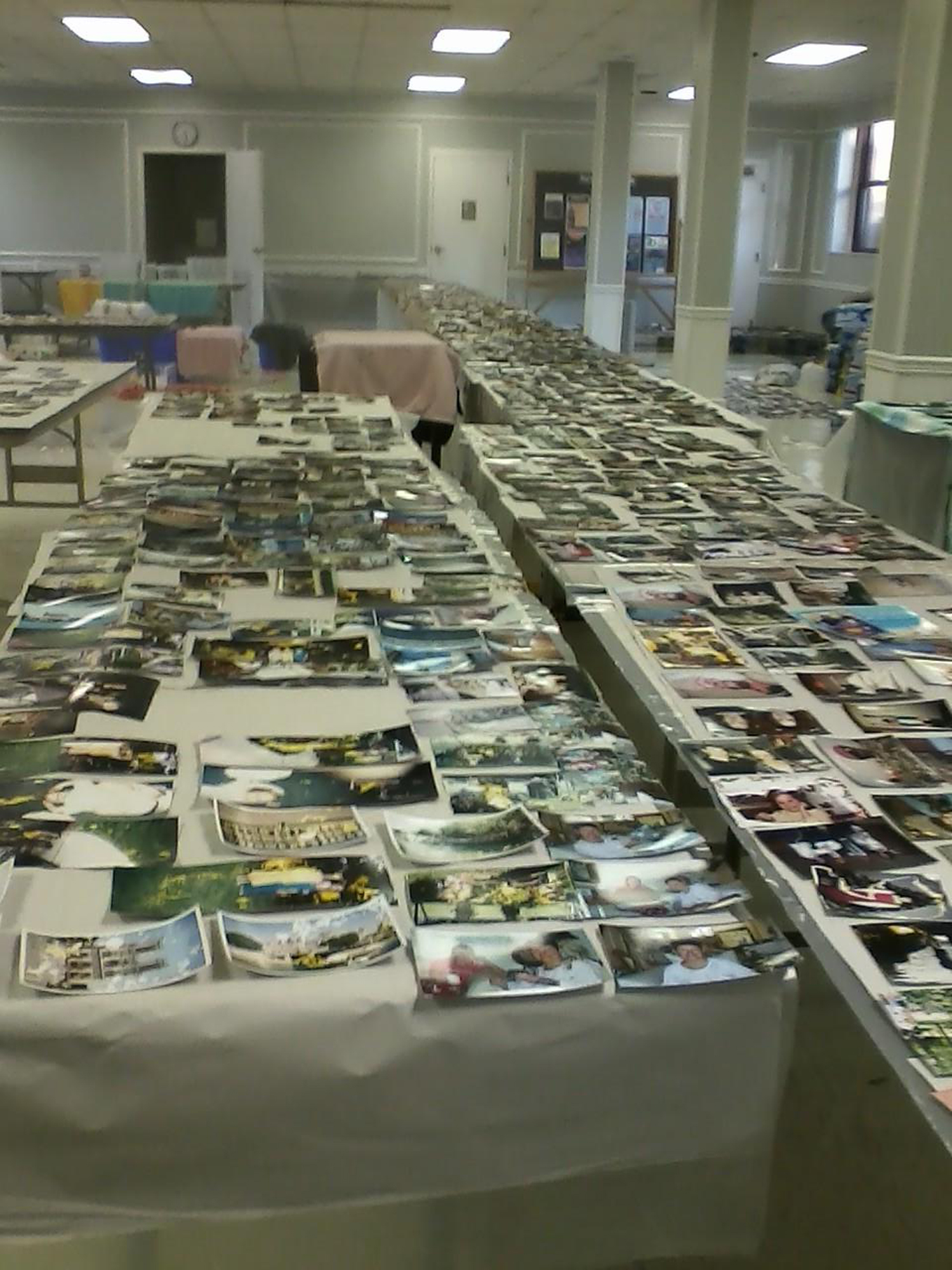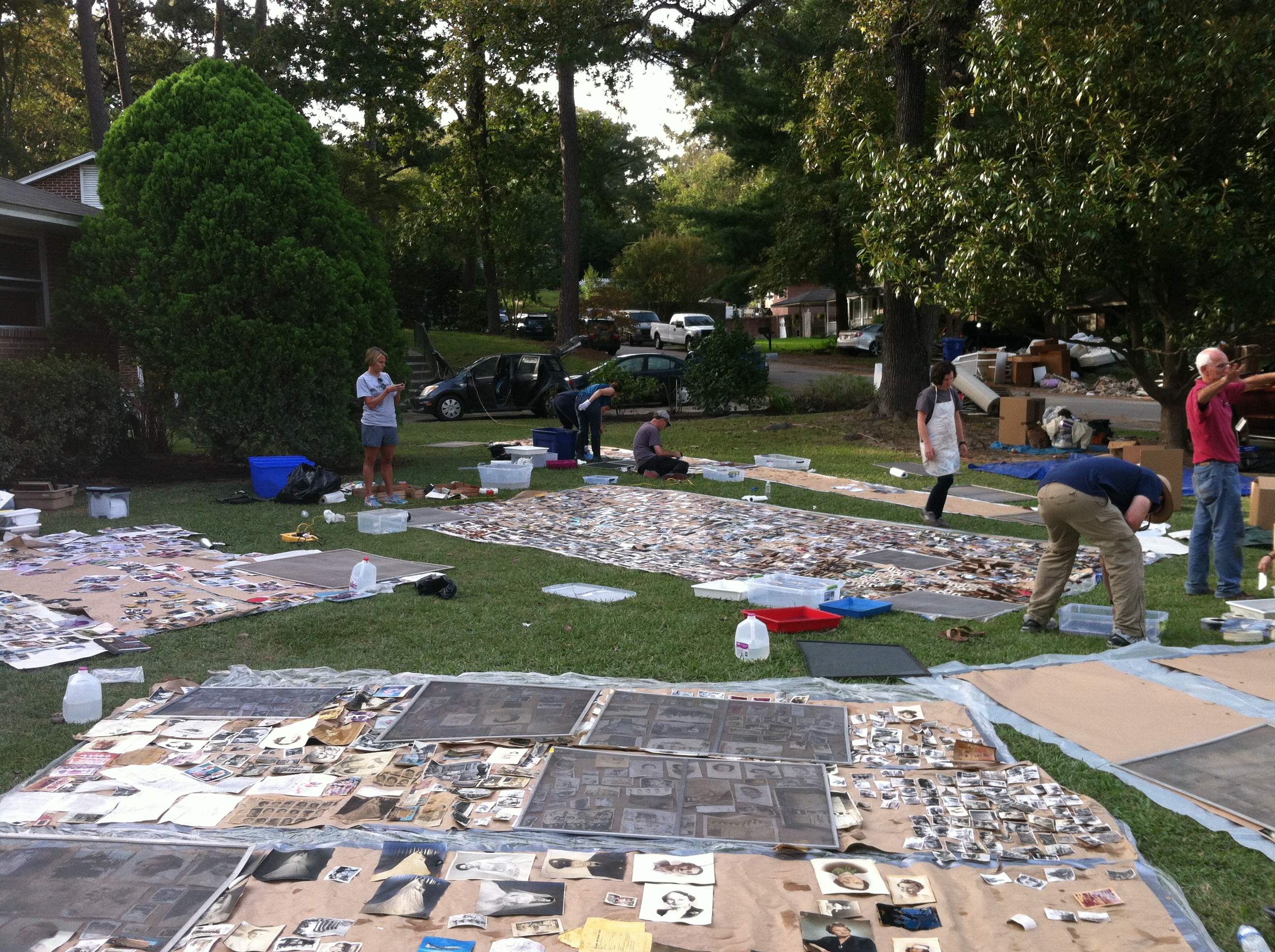May Day in Columbia
By Beth Bilderback
It seems like yesterday, when the rains came upon Columbia and left devastation in their wake. And although it has been over a year now, many people are still dealing with the loss of property and life. I was one of the fortunate ones as my house sits on a high spot in Columbia, so I spent the first couple of days watching the flood scenes played over and over on the television, thinking I should be doing something. Then my neighbor provided me with the perfect opportunity to use my professional expertise to help people in real need.
What we found in one Columbia neighborhood where the water reached the tops of some homes, was played out in several areas. People were in shock; they saw everything as a total loss, and piled it on the streets. People were in shock, and there was no potable water in the city. And this is where most of my disaster training was turned on its head.
We train to take care of our own collections or to help other cultural institutions, so there is a mutual understanding of caring for materials. But that understanding was lacking when we went to help. Most people don’t give much thought to preservation in the best of times, and this was definitely not a good time. And as we walked around offering to salvage photographs, we found amazement that such a thing could be done followed by gratitude that something could be saved. We started small but quickly found more volunteers.
We started the salvage work in the neighborhood, not only to promote visually what we were doing but so victims could see their photographs were still there. As more rains came and the number of collections grew, we worked in our homes and in churches. We could not follow the strict guidelines set forth in most preservation training programs due to various conditions, but we saved almost 5,000 photographs, slides, negatives and artwork for people who had lost everything else. If you want to read more about my experiences, please see the Fall 2015 issue of Caroliniana Columns http://scholarcommons.sc.edu/columns/38/


World War I and the Clemson Community
By Brenda Burk
In April 1917, the United States entered the Great War. To mark the 100th anniversary, the Clemson University Libraries’ Special Collections and Archives looks back at Clemson’s response to the United States’ entry in the Great War that had been entrenched in Europe for nearly three years. It includes an overview of the war experiences of Clemson students, alumni, faculty, and staff, as well as the Army and Navy training programs that took place on campus, the hiring of the College’s first women faculty members and the devastating influenza pandemic of 1918-1919.
The war experiences of Thomas S. Buie, Class of 1917, are examined in more detail through his letters and photographs. Thomas Buie left Clemson with several dozen classmates shortly before graduation to attend Reserve officer Training Camp at Fort Oglethorpe in Georgia. They trained in both old and new methods of warfare, particularly fighting from trenches. He went on to train at Camp Jackson in Columbia and Camp Sevier near Spartanburg before being sent overseas. Buie served on the front lines in France until the war ended.
“We are simply taking things easy, nothing much to worry about, keep on the alert at all times in case anything does happen. I have not heard half a dozen shots all day… You should see me eating all kinds of things. We had boiled rice with bacon (a regular mush) and you should have seen me eating it. Also any kind of jam is good, am not at all particular. You should see me going around in my trenches at night, of course we move very carefully for fear of being heard. This war will teach us the uselessness of many things – such as flash lights, beds and many other things” -- Thomas S. Buie, At the Front, Oct. 2, 1918
After the war Thomas Buie remained in France and England for several months. After returning to the U.S., he earned a PhD in Agronomy, eventually working at Clemson and later as director of the Soil Conservation Service Southeastern Regional Office and one of the founders of the Soil Conservation Society of America.
If in the Clemson area, please visit the exhibit located on the 3rd level lobby in the R.M. Cooper Library, 116 Sigma Dr., Clemson, SC (map and directions) through May 15, 2017.
Clemson University Libraries’ Special Collections and Archives is a portal to the past, present, and future. It documents the past by collecting items of historical significance to the University and community, making them accessible in the present and preserving them for research needs of the future. Special Collections and Archives continues to build a premier research collection of primary resources regardless of format (paper, photographs, digital, analog, and 3-dimensional), as well as rare books, that supports Clemson University’s teaching and research needs. The collection includes a particular emphasis on agriculture, architecture, politics, the National Park Service and tourism, community and university history. Special Collections and Archives creates an environment of discovery and engagement with these holdings that encourages scholarly inquiry, creative thinking and lifelong learning. They work closely with courses in utilizing primary research materials, as well as providing public programming and working with local cultural heritage institutions.

Director’s Take on the Spring Workshop - Update: Registration Open!
By Katie Womble & Brenda Burk
Time’s running fast (don’t forget to spring back this weekend), and we’ve got a workshop coming up! Brenda Burk and myself are planning the Spring Workshop, and want to share a couple of details as things start to take shape. Get ready for more details in the next few days.
Our focus this year is “(Out)reaching to the Universe on a Ground Level Budget”.
Mark your calendars, because on April 24th you can attend a workshop that will focus on bringing together experts and resources – and each other – to discuss how to better perform outreach to our communities. Charity Rouse, Director of Local History at Spartanburg County Public Libraries, will present on galvanizing community archiving through your organization, followed by a panel of news media outlet speakers who will share the inside scoop on how to effectively present information to them in order to get it to the public.
We will be having our annual workshop at the main branch of Spartanburg County Public Libraries. The schedule looks a little something like this…
10:00 a.m. - 10:30 a.m. Registration and Social
10:30 a.m. - Noon Behind the scenes of Attics to Archives
An overview of this project of the Spartanburg Public Library discussing their successful and not so successful efforts in community outreach and involvement. It will be followed by questions and answers time with a panel of their staff to answer questions from the group but also questions to the group to think through for themselves.
12:00 Noon - 1:00 p.m. Lunch (provided)
1:00 p.m. - 2:00 p.m. Getting their attention!
How can we get the attention of local news media outlets to publish stories about our collections, services, and projects? Editors from the Spartanburg Herald-Journal will give us tips and advice on what they will publish in their newspaper. We will then be able to create our “elevator speeches” to grab their attention and get our work noticed in the community.
2:00 p.m. – 2:30 p.m. Brainstorming Session
During the day, we have learned a lot! The ending session will be a time for others to share their experiences and to brainstorm potential ideas on how to enhance their outreach activities at their organization.
Breakfast (coffee, tea, pastries) and lunch included.
President's Corner, February 2017
By Morgan Jones-King
Happy February, y’all!
2017 is off with a running start! The new board convened for its first meeting of the year in January, and we discussed a few changes, the annual theme, and future programming. We were delighted to welcome Zach Johnson on board as the new treasurer and Brenda Burk as the first-year director. We’re also pleased to announce this blog and its new editor, Bryan Brown! We decided to transition to a blog and leave behind the newsletter platform this year for several reasons. First, we felt that we would like to be able to share newsletter-worthy items with the SCAA membership more regularly. Secondly, we felt that a blog could generate more interest from our membership both for contributions and consumption. Finally, the blog provides greater transparency of the executive board with occasional updates from officers on their positions. We hope that the blog is a successful endeavor and look forward to feedback!
Our annual theme of 2017 is “South Carolina at War.” 2017 marks the centennial of the United States’ entry into World War I, the end of United States’ involvement in the Mexican Expedition (1916-1917), and the creation of Fort Jackson here in South Carolina. Additionally, we can look to 2018 as the fast approaching 50th anniversary of Vietnam. This year is a unique time to highlight the preservation of military records and memorabilia both in institutional and private hands. With this theme in mind, we’re looking forward to a year of events featuring everything from military service to conscientious objection to civilian contribution! I’d like to take the opportunity to thank our first and second-year directors, Brenda Burk and Katie Womble, in advance for all they will be doing to put together our program this year: a spring workshop and a fall conference. A blog post on plans for this year’s programming from the directors will be coming soon! I’d also like to thank Nathan Saunders, this year’s Vice-President/President Elect on all he’ll be going to arrange the summer social!
Wrapping up, we are also hoping to institute a series of pop-up meetings this year. Pop-ups will be informational sessions on SCAA, how membership can benefit the audience, and how they can be more professionally involved. With these informal meetings, we hope to increase our membership and reach groups that would not otherwise be aware of SCAA such as student organizations and local history societies. Our first pop-up meeting is planned for later February with the USC group SCALM – the Student Cooperative for Archives, Libraries, and Museums. If you have a group in mind who could benefit from SCAA membership or is interested in more information, email us at info@scarchivists.org!
SCAA Annual Meeting Registration Now Open!
When: Friday, October 28, 2016
Where: Presbyterian College, James H. Thomason Library
503 South Broad Street, Clinton SC 29325
Time: 9:45 a.m. to 3:00 p.m. (onsite registration available from 9:00 – 9:45 am)
Registration is now open for the South Carolina Archival Association’s 2016 Fall Conference, “Sights and Sounds of South Carolina”. This year’s theme focuses on the rich audio and visual resources housed throughout the state in museums, archives, and libraries.
Our keynote speaker is civil rights photographer Mr. Cecil Williams, an eyewitness to and chronicler of many important events of the civil rights movement and of social change in South Carolina. He will not only share his experiences during this dynamic time in local and national history, but also his current project to catalog and preserve thousands of negatives and images in his vast body of work, working in tandem with Claflin College in Orangeburg.
Registration fees are $35 members; $50 nonmembers (includes membership fee); $15 students. Registration fees include a buffet lunch; some vegetarian items will be available.
The Call for proposals is active, and can be found here: Call for Proposals
Register Now!
Page 25 of 33
